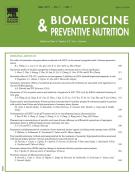Ginkgo biloba extract 761 prevents hypoxia-triggered cardiomyocyte apoptosis through inhibiting mitochondrial and ER stress-induced apoptotic signaling - 26/11/11

Abstract |
Background |
Whether Ginkgo biloba extract (EGb) 761, an herbal chemical with cytoprotective properties, could counteract hypoxia-induced apoptosis of cardiomyocytes remains unclear.
Methods |
Cultured neonatal rat cardiomyocytes pretreated with vehicle or EGb 761 were exposed to anoxia for up to 24h. Viability and apoptotic indexes of myocardial cells were assessed and relevant mediators in both the mitochondrion-dependent and the endoplasmic reticulum (ER) stress-activated apoptotic signaling pathways were examined.
Results and conclusion |
Trypan blue exclusion, lactate dehydrogenase release and flow cytometric studies demonstrated hypoxia impaired viability and induced apoptosis of cardiomyocytes from 2h of exposure throughout the whole 24h. Immunofluorescence, protein and RNA analyses further illustrated hypoxia depolarized mitochondrial membrane potential, triggered cytochrome c release into cytosol and activated ER stress pathway mediators XBP-1, ATF4, eIF-2⍺, ATF6 and GRP 78 leading to up-regulation of downstream pro-apoptotic transcriptional factor C/EBP homologous protein. In contrast, EGb 761 pretreatment suppressed nearly all of the aformentioned apoptosis-evoking actions of hypoxia on myocardial cells except the expression of ATF4 and eIF-2⍺. Thus, EGb 761 effectively prevents hypoxia-induced cardiomyocyte apoptosis through inhibiting both mitochondrion-dependent and ER stress-activated signaling, and may thereby serve as an antagonist against this cytotoxic insult in clinical practice.
Le texte complet de cet article est disponible en PDF.Keywords : Hypoxia, Cardiomyocyte, Apoptosis, Ginkgo biloba, Mitochondrion, Endoplasmic Reticulum
Plan
Vol 1 - N° 4
P. 282-293 - octobre 2011 Retour au numéroBienvenue sur EM-consulte, la référence des professionnels de santé.
L’accès au texte intégral de cet article nécessite un abonnement.
Déjà abonné à cette revue ?

